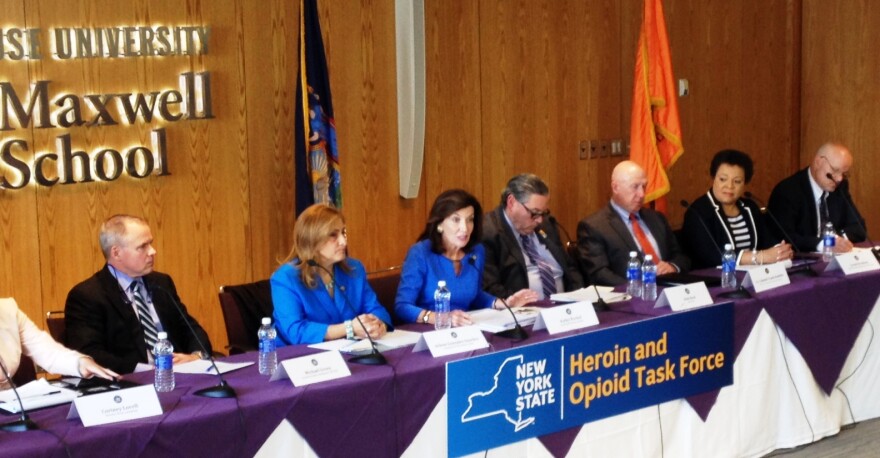Governor Cuomo’s statewide task force on heroin and opioid abuse stopped in Syracuse Wednesday to hear testimony from area treatment experts on what’s needed to address the epidemic. The discussion revealed there are significant gaps in treatment.
Nicole Siriano is one of only three Narcan trainers in Oneida county who has taught more than 850 law enforcement officials and families how to use the medication to reverse an opioid overdose. She also runs the Milestones Clinic in Utica. When asked by task force Chair Lieutenant Governor Kathy Hochul about what happens after a person is revived, Siriano wasn’t sure.
"I don't know. I don't have an answer to that question," Siriano said.
"Not having the answer answers my question," Hochul said." Because if you're the trainer, there's not a step where you're saying, when you're in this situation, when you revive someone, you now do 'x' with that information."
President of Syracuse Behavioral Healthcare Jeremy Klemanski had an idea:
"Why don't we create a very simple portal where emergency responders have to put in the most basic information that would trigger a notification to the department of health or OASAS [Office of Alcoholism and Substance Abuses Services] that then requires a health home or treatment provider to make a follow-up call to at least try to engage those folks."
Others expressed concern about state programs and insurance companies allowing enough time for detoxification as the initial step to a full continuum of treatment. James Scordo has been with the Credo Community Center for the Treatment of Addictions in Jefferson County for 35 years. He says providers spend a great deal of time arguing over whether it’s necessary to keep an addict beyond three or seven days. Scordo says recovery is a much longer process.

"Part of that is changing habits, reunification with family, social skills, relapse prevention skills, education, employment readiness skills, housing, improving physical health, wellness, spiritual health. All of that can't be expected to happen in 30 days or less."
Jeremy Klemanski says the brain damage from opioid addiction doesn't heal in a month.
"Most of the research I've seen shows that the biggest gap from remission not ending or relapse is about a six month break. Why? Because it takes time for people to learn how to eat again, to learn how to sleep again."
Klemanski says many addicts have eating and sleeping disorders, as well as psychological trauma. Members of the task force wanted to know how does the path to addiction to begins and how it can be stopped. James Scordo says thinking differently about how to manage pain and educating doctors is key.
"When someone has surgery, is it necessary for a 30 days supply of pain pills?" Scordo asked. "When you have a tooth pulled, is a necessary for a 30 day supply? Could we give a three day supply, and they could come back? After three days, see if they can get by with the Ibuprofen."
The panel wants mandatory prescriber education for doctors about addiction, opiates, and treatment options. They also asked the commissioner of OASAS to quickly deploy a program to build capacity for more treatment services.
The experts also expressed concern about a shortage of doctors and nurses willing to work with addicts, and trouble recruiting and retaining doctors and nurses to work in rural areas. The task force is in Buffalo Thursday. They hope to have legislation to state lawmakers by the end of their session in mid-June.




